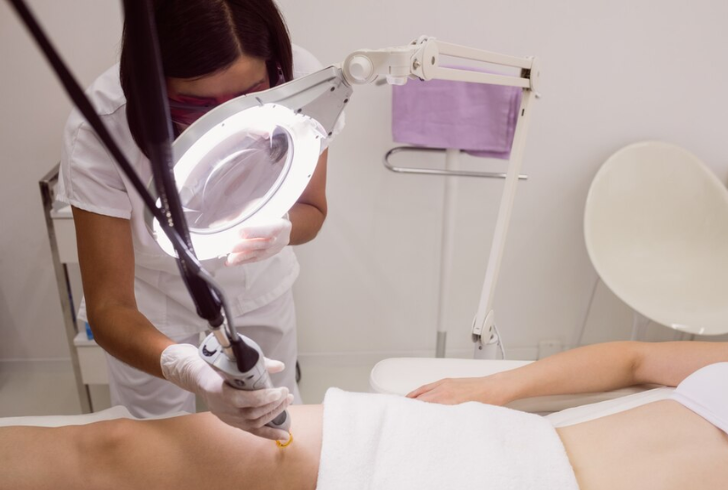Dreaming of ditching the razor and achieving long-lasting smooth skin? Laser hair removal might be the answer you’ve been searching for. This innovative technology utilizes concentrated light beams to target and disable hair follicles, leading to a significant reduction in unwanted fuzz. But with any medical procedure, questions and concerns are natural. One worry that frequently pops up: Can laser hair removal cause cancer?
Let’s delve deeper and separate fact from fiction.
Understanding Laser Hair Removal

Freepik | prostooleh | Laser hair removal works wonderfully by harnessing the power of light.
Laser hair removal works like a charm by harnessing the power of light. The laser emits a specific wavelength that gets absorbed by the pigment (melanin) in your hair follicles.
This targeted energy heats up the follicles, effectively disabling their growth potential. While the treatment sounds technical, the experience is generally well-tolerated, with most people experiencing minimal discomfort.
Common Side Effects
Like any procedure, laser hair removal can cause some temporary side effects. These are usually mild and fade away within a few hours or days.
Here’s a quick rundown of what to expect:
-
Redness and Irritation: It’s common to experience some temporary redness and irritation after the treatment. Think of it as a mild sunburn sensation. Thankfully, this usually resolves on its own or with the help of a cool compress.
-
Skin Tone Changes: Occasionally, laser hair removal might cause slight changes in your skin tone. People with lighter complexions may experience temporary hyperpigmentation (darkening), while those with darker skin tones might see hypopigmentation (lightening) in the treated area. These changes are typically temporary and fade over time.
Minimizing Risks

Freepik | senivpetro | Rare but severe side effects linked to inexperienced practitioners or improper at-home laser use.
While uncommon, more severe side effects can occur. These risks are often associated with inexperienced practitioners or improper at-home laser use.
Here’s what to watch out for:
-
Scarring: Individuals prone to scarring are at a higher risk of developing scar tissue after laser hair removal. Discussing this possibility with your doctor beforehand is crucial.
-
Blisters and Crusting: These can occur if you don’t follow post-treatment sun protection guidelines. Remember, sun exposure is a no-no after laser hair removal!
-
Paradoxical Hypertrichosis: This fancy term translates to unexpected hair growth in the treated area. While rare, it’s a possibility, especially for individuals with hormonal imbalances or those taking certain medications.
Pregnancy Pause – Safety First
While laser hair removal boasts impressive results, it’s not recommended during pregnancy. The safety of this procedure for expecting mothers hasn’t been thoroughly studied. It’s best to wait until after delivery and consult your doctor before booking your first appointment.
Can Laser Hair Removal Cause Cancer? Dispelling the Myth

Freepik | wavebreakmedia_micro | Non-ionizing radiation, unlike tanning beds or X-rays, doesn’t harm DNA, which causes cancer.
This is a big one! Can laser hair removal cause cancer? The answer is a resounding no. The lasers used in hair removal procedures emit a specific type of light called non-ionizing radiation.
Unlike tanning beds or X-rays, which utilize ionizing radiation, non-ionizing radiation doesn’t damage your DNA, the culprit behind cancer development. In fact, some lasers are even used to treat precancerous skin lesions!
The Final Shave
Laser hair removal offers a safe and effective solution for achieving long-lasting smoothness. While temporary side effects are possible, they’re typically mild and resolve quickly. To minimize risks, choose a board-certified dermatologist or licensed medical professional with expertise in laser hair removal.
By following proper pre- and post-care instructions, you can enjoy the benefits of laser hair removal with complete confidence. So, ditch the razor and embrace a smoother you!







